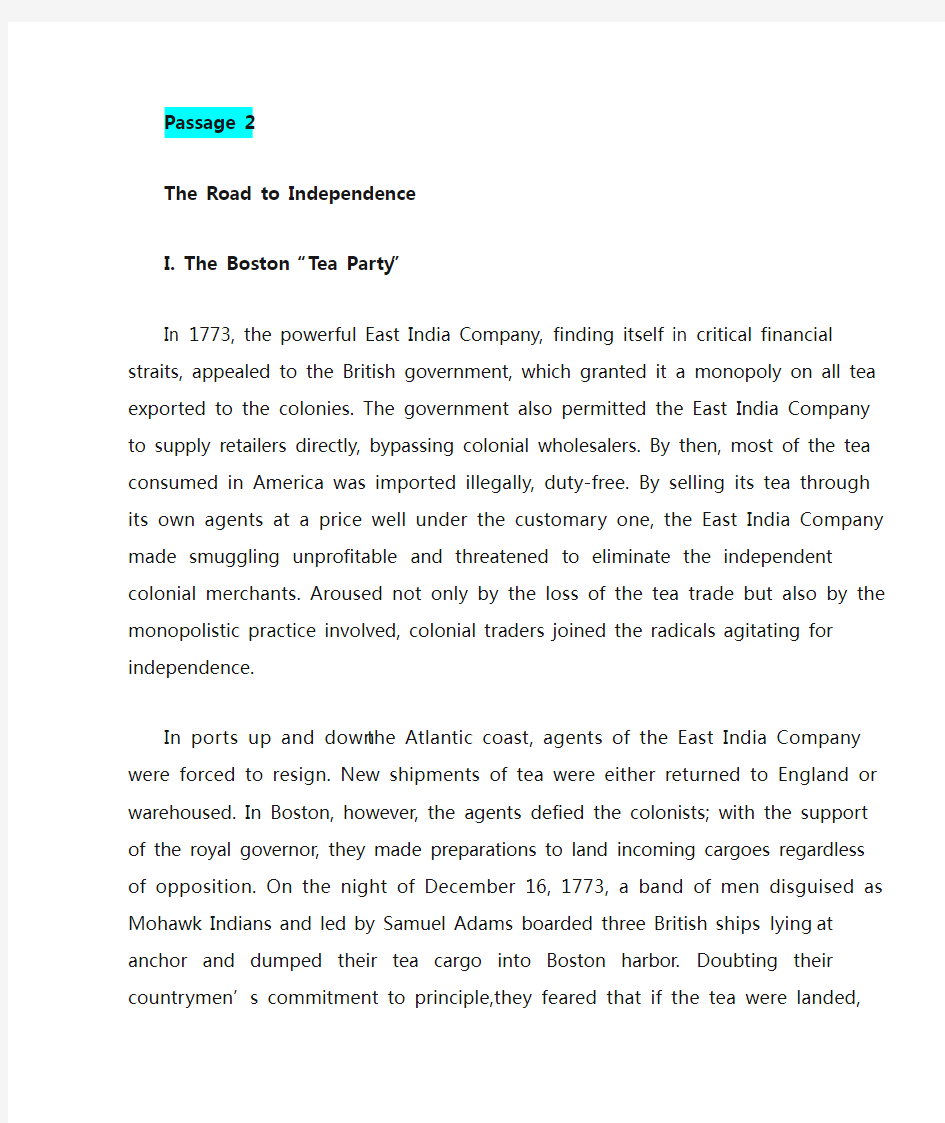美国文化背景

- 1、下载文档前请自行甄别文档内容的完整性,平台不提供额外的编辑、内容补充、找答案等附加服务。
- 2、"仅部分预览"的文档,不可在线预览部分如存在完整性等问题,可反馈申请退款(可完整预览的文档不适用该条件!)。
- 3、如文档侵犯您的权益,请联系客服反馈,我们会尽快为您处理(人工客服工作时间:9:00-18:30)。
Passage 2
The Road to Independence
I. The Boston “T ea Party”
In 1773, the powerful East India Company, finding itself in critical financial straits, appealed to the British government, which granted it a monopoly on all tea exported to the colonies. The government also permitted the East India Company to supply retailers directly, bypassing colonial wholesalers. By then, most of the tea consumed in America was imported illegally, duty-free. By selling its tea through its own agents at a price well under the customary one, the East India Company made smuggling unprofitable and threatened to eliminate the independent colonial merchants. Aroused not only by the loss of the tea trade but also by the monopolistic practice involved, colonial traders joined the radicals agitating for independence.
In ports up and down the Atlantic coast, agents of the East India Company were forced to resign. New shipments of tea were either returned to England or warehoused. In Boston, however, the agents defied the colonists; with the support of the royal governor, they made preparations to land incoming cargoes regardless of opposition. On the night of December 16, 1773, a band of men disguised as Mohawk Indians and led by Samuel Adams boarded three British ships lying at anchor and dumped their tea cargo into Boston harbor. Doubting their countrymen’s commitment to principle, they feared that if the tea were landed, colonists would actually purchase the tea and pay the tax.
A crisis now confronted Britain. The East India Company had carried out a parliamentary statute. If the destruction of the tea went unpunished, Parliament would admit to the world that it had no control over the colonies. Official opinion in Britain almost unanimously condemned the Boston T ea Party as an act of vandalism and advocated legal measures to bring the insurgent colonists into line.
II. the Declaration of Independence
The Declaration of Independence was written largely by Thomas Jefferson, who had displayed talent as a political philosopher. Jefferson claimed that he used 'neither book nor pamphlet' when writing the declaration, but his work reflected a broad understanding of 18th-century political thought. Perhaps the greatest influence on Jefferson came from Enlightenment thinkers. These philosophers believed that the natural world was organized in a logical and reasonable pattern. While acknowledging that this pattern derived from the
ultimate wisdom of God, they also held that the world was understandable through the powers of human reason. The writings of French, English, and Scottish Enlightenment philosophers frequently presented the concept that all men are created equal and possess certain inalienable rights. Jefferson’s belief in the social contract came from British political philosopher John Locke, who argued that government existed by consent of the governed and that people should rebel if their natural rights were violated.
The Declaration of Independence, adopted July 4, 1776, not only announced the birth of a new nation, but also set forth a philosophy of human freedom that would become a dynamic force throughout the entire world:
We hold these truths to be self-evident, that all men are created
equal, that they are endo w ed by their Creator w ith certain
unalienable Rights, that among these are Life, Liberty and the
pursuit of Happiness. — That to secure these rights, Governments
are instituted among Men, deriving their just pow ers from the
consent of the governed,—That whenever any Form of
Government becomes destructive of these ends, it is the Right of
the People to alter or to abolish it, and to institute new Government,
laying its foundation on such principles and organizing its po wers in
such form, as to them shall seem most likely to effect their Safety
and Happiness.
